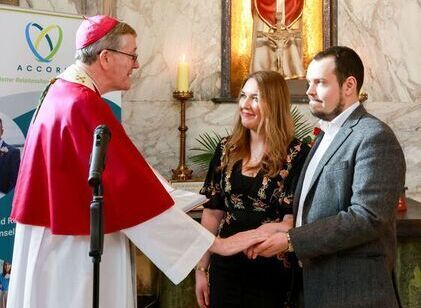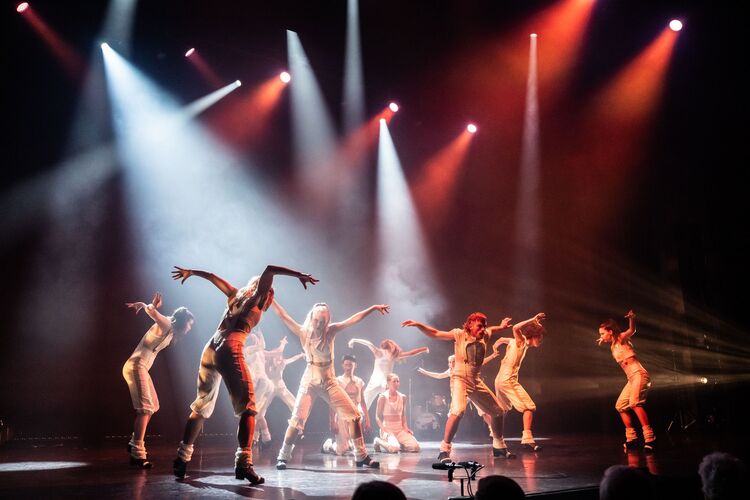By Colleen Taylor
True friendship, like good music, has no time limit—as composer Antoni O’Breskey recently reminded me. At 68 years of age, O’Breskey (Breschi) is still working on a legacy—not just for himself, but also for one of his dearest friends, Ronnie Drew. Ten years after Drew’s death, O’Breskey has released an album entitled “From Dublin to Bilbao,” including previously unpublished tracks by the Dubliners singer—a testament to the musical friendship they made together.
Ronnie Drew needs no introduction in this newspaper, but Antoni O’Breskey might. Born in Florence with Argentinian roots, O’Breskey studied piano in the Flamenco, blues, jazz, and Latin styles, becoming particularly interested in the Irish tradition early on in his career. O’Breskey is famous for pioneering the inclusion of the piano in Irish genres. A composer and multi-instrumentalist, he has been hailed by many of Celtic music’s most renowned musicians and artists from Andy Irvine to Scottish radio host Fiona Ritche as a vital visionary for the “worlding” of Irish music. He stands as one of the trailblazers of the new age and world music phenomenon in Ireland and abroad. Significantly, O’Breskey helped to lead the crossover of Irish and Flamenco genres, later popularized by shows like “Riverdance.”
O’Breskey first came to Ireland in the 1970s, where he soon met Ronnie Drew and other forerunners in the folk music revival, and the rest was history. Within the last decade, some of his projects have involved the exploration of Irish music through the medium of a trumpet, trad-blues infusions, and the mixing of Irish song and Basque art. And because of his great friendship with Ronnie Drew, Ireland is not only a creative home base but also a literal home base for O’Breskey. It was Drew who sealed O’Breskey’s lifelong romance with the nation and its culture.
Now, as a thanks and as a memorial, O’Breskey has compiled a 19-track collection of the two musicians’ work together over the years, including live recordings and other tracks that have not yet been published, such as “Nora” and “Red Roses,” sung by Drew. He says of this album: "Before Ronnie died, he asked me many times to put together all the work we had done the last 15 years,” O’Breskey said, “So this album is not just the expression of the musical journey Ronnie and I did together, but the manifestation in music of all the feelings that accompanied us during many years of sharing not only professional experiences, but overall life experiences."
“From Dublin to Bilbao” is as much biography as discography. In the liner notes, O’Breskey recounts the journey of his friendship with Drew, setting the scene of their chance meeting in a pub like a fateful romance. He mentions their trips to Bilbao and Bari, their speaking in Spanish together (Drew spent some time teaching English in Spain in early adulthood), playing Irish music, and even more emotional details, such as how Drew helped O’Breskey find his lost daughter, and what they talked about at the end of the singer’s life.
In addition to its emotional and memorial impact, “Dublin to Bilbao” also evidences O’Breskey’s musicial vision, which not only sees beyond cultural barriers, but plows through them. For this composer, musical categories of genre, century and nation bear no restriction or limitation for his creativity—he brings all eras and cultures together in one musical space. In O’Breskey’s eyes, musical cultures are not defined by borders, but by historical roots that reach deeply across all areas of the globe. Like Drew did with the Dubliners, O’Breskey imbues the music he plays in the 21st century with the values and integrity traditional and classical music holds.
What’s most interesting about “Dublin to Bilbao” is that Ronnie Drew does not exactly match O’Breskey’s global description. The singer was known almost exclusively as a Dubliner—both by his band and his native Dublin. His is the voice of the local while O’Breskey’s is the global, but when they combine forces, both sounds cohabitate so that you can imagine yourself in the local pub down the street at the same time you step onto the global music stage. You can hear this most vividly in “Munagorriren Oihartzunean,” which as its title might suggest, is a world sounds track, but sung in Drew’s Dublin accent. Perhaps what makes this album work is simply the old truism that opposites attract.
There are too many rich moments on “Dublin to Bilbao” to mention all of them, but some highlights include “Dolphin Waltz in Dingle,” O’Breskey’s original, to “Simple Way,” which Drew sings with Shirley Grimes. Fittingly, and touchingly, the final song on the album is “We Are the Music Makers,” featuring O’Breskey on piano and Drew on vocals. When Drew was sick, he wistfully told O’Breskey: “Bring me back to Bilbao.” Ten years and 19 tracks later, that is just what O’Breskey has done.








